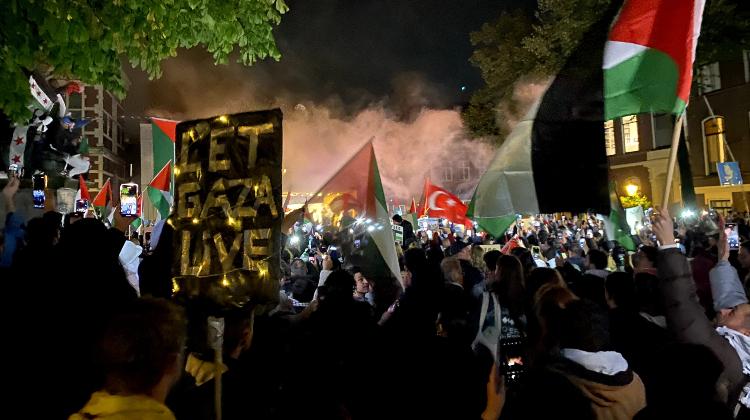'None of us are free until we all are'
Not my university

Who is the university? Is the university the hundreds and thousands of students, researchers and teachers organising teach-ins, signing petitions and participating in demonstrations to end genocide? Or is the university the carefully crafted statements in my inbox that claim neutrality and offer pseudo-support?
We can debate the difference between institutions and people, those at the top of the hierarchy and the ones breaking under the weight of it. But I don’t have the words right now to be coherent, critical and convincing because, like the alumni, students, teachers and colleagues at universities worldwide, I have a broken heart.
Standing in a crowd at Domplein demonstrating for a cease-fire, I am proud that Utrechters came in their droves to oppose ethnic cleansing. Standing shoulder to shoulder with other women, men, non-binary people, queers, children, people with disabilities, the elderly and even babies, tears stream down my face. I squeeze my friend’s hand tighter. Sitting on my friend’s couch, I choke up as she shares the terror slicing through her family living in Israel who were victims of a Hamas attack. I wipe my eyes during a board meeting as my colleague talks about the insurmountable pressure she’s facing as a teacher, activist and racialised scholar.
The university has medicalised responses like mine. “If you need support, talk to one of our counsellors”. I struggle to understand how the institution’s response to over one thousand signatures on an open letter demanding the university take accountability for its actions and position of influence is to offer us therapy.
I was supposed to submit this column last week, but I hesitated. I’ve spoken to teachers from universities across Europe and the UK working in Gender Studies and related fields and they’re all saying the same thing: academics are under fire for their activism to Free Palestine. At the beginning of my career, I can’t help wondering if this article will put me in the same position. But that is the essence of solidarity, none of us are free until we all are.
My field, Gender Studies, has been criticised for its uselessness, lack of job prospects and nit-picking over nuance. However, as my dear friend reminded me recently, if gender studies are so useless, then why do oppressive regimes seek to suppress our knowledge, ideas and discipline as a whole? What we say, the discussions we have, and our demands, must be very dangerous indeed.
If you studied Gender Studies, early on you would find the texts of Judith Butler explaining how some lives are made more "grievable" than others in projects of oppression. And so it would be clear to you too that silence means complicity in violence. I can’t claim to fully grasp the algebra of oppression that makes the Israeli apartheid system possible. But as a South African, I know intimately that the tactics of boycotts, divestments and sanctions are powerful tools that can end oppressive regimes. As it turns out, more than five people read my columns, so here’s one more voice demanding action from the university.
Utrecht University must acknowledge and condemn the violence carried out by the Israeli regime on Palestinians.
Utrecht University must actively engage in generating knowledge on the occupation of Palestine.
Utrecht University must acknowledge its accountability in the enduring dynamics of the Israeli settler-colonial project.
Utrecht University must cease collaboration with Israeli institutions and companies.
Utrecht University must acknowledge and rectify the harm caused by previous collaborations with institutions directly involved in the illegal land occupation, education, military research, and water dispossession.
Utrecht University must express support for Palestinians within the institution who may be hesitant to voice their concerns and condemn all forms of racism, antisemitism, and Islamophobia.
Utrecht University can no longer claim neutrality on the colonial practices in Palestine.